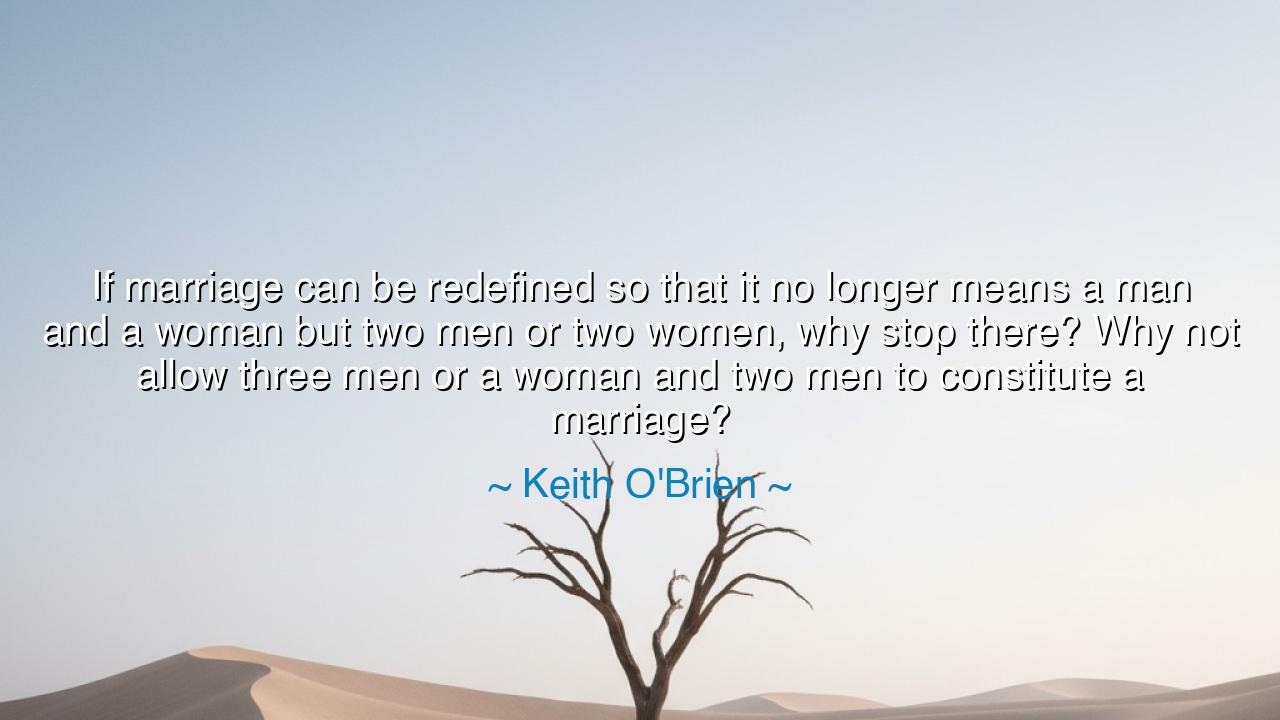
If marriage can be redefined so that it no longer means a man and
If marriage can be redefined so that it no longer means a man and a woman but two men or two women, why stop there? Why not allow three men or a woman and two men to constitute a marriage?






In the echoes of time, where moral winds have shifted and re-shifted like the tides, there arose a voice that sought to guard the sanctity of tradition. Keith O’Brien, a man of faith and conviction, once declared, “If marriage can be redefined so that it no longer means a man and a woman but two men or two women, why stop there? Why not allow three men or a woman and two men to constitute a marriage?” These words, forged in the fires of controversy, stand not as a mere question, but as a warning, a meditation upon the nature of change and the boundaries of meaning. In this quote lies the ancient tension between tradition and transformation, between what has long been held sacred and what the spirit of the age seeks to remake in its own image.
To understand this utterance, one must first grasp the heart of its concern. O’Brien does not speak solely of marriage—he speaks of the essence of definition itself. For when a word loses its center, its roots untethered, it drifts like a ship without anchor upon the seas of human whim. In times long past, the union of man and woman was seen as the foundation upon which civilization was built—the joining of strength and nurture, seed and soil, life and legacy. Yet, in the age of shifting norms, the call arose to expand the boundaries of that sacred bond. O’Brien’s question, therefore, is not merely of policy—it is of philosophy: if the borders of meaning are erased, what remains to hold us steady when the winds of interpretation blow too strong?
In the ancient land of Greece, the philosopher Plato spoke of balance—the golden mean—where excess and deficiency alike led to ruin. If we stretch a form beyond recognition, even with noble intent, we risk breaking the very vessel that holds the water of truth. Consider the story of Emperor Nero, who once sought to rewrite Rome’s customs in his own image, marrying not only women but also men in public ceremony. The empire watched in confusion as the boundaries between love, power, and performance blurred into shadow. Rome, once mighty in virtue, soon decayed in moral clarity. This is not to condemn affection or choice, but to remind us that every civilization must guard the definitions upon which its harmony depends.
Yet, O’Brien’s question also burns with emotional fire—it reveals the fear of endless redefinition. When the river leaves its banks, it nourishes the plains for a time, but if it never returns, it becomes a flood. In every generation, humanity faces this dilemma: how to adapt without erasing the wisdom of its ancestors. For progress, unmoored from principle, may devour itself. And tradition, hardened against compassion, may become a cage. The challenge lies not in choosing one over the other, but in balancing mercy with order, freedom with form.
There are those who would argue, rightly, that love knows no gender and that justice demands inclusion. Indeed, love is vast, mysterious, and divine—it cannot be measured by law alone. But O’Brien’s words urge caution: when we reshape an institution as fundamental as marriage, we are reshaping not only the lives of individuals but the architecture of society itself. Like an ancient temple whose pillars are replaced, we must ask—will the roof still stand? To rebuild is noble; to rebuild without wisdom is perilous.
And yet, let us not misjudge the man’s heart. Behind his stern inquiry may lie a yearning for stability, for a world that does not dissolve its sacred symbols too quickly. The wise do not fear change—they fear thoughtless change. Thus, the quote calls us not to reject transformation, but to engage it with reverence, reason, and restraint. For the ancients taught: “Do not move the boundary stones set by your fathers until you have learned why they were placed there.”
From this, O seeker of wisdom, draw your lesson. Every age will challenge the old ways, and rightly so, for truth must be tested to remain pure. But before you tear down the walls of meaning, ask: What purpose did they serve? What new foundation will you build in their place? The future belongs not to those who destroy or those who resist, but to those who preserve the essence while renewing the form.
So, let your actions be guided by both compassion and contemplation. Honor love in all its forms, but do not forsake the wisdom that binds societies together. If you would change the world, do so with patience, with depth, and with prayer. For to redefine without reflection is to invite chaos—but to reflect deeply and then act is to become a true architect of destiny. Thus spoke the elders, and thus must we remember: freedom without wisdom is a flame without a lamp—bright for a moment, but soon consumed by the darkness it fails to illuminate.






AAdministratorAdministrator
Welcome, honored guests. Please leave a comment, we will respond soon